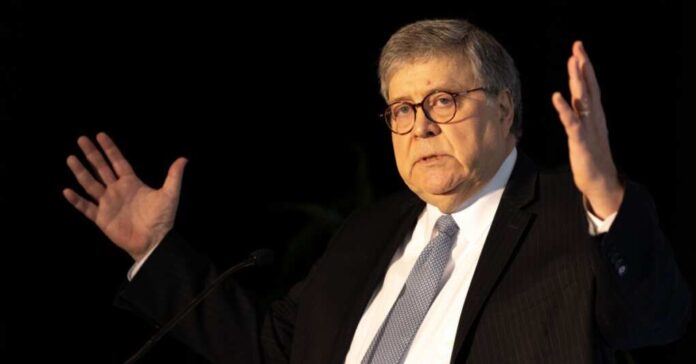
Former President Donald Trump has gained another unexpected ally in his quest for reelection. Bill Barr, former Trump Attorney General, has reaffirmed that he will vote for the Republican ticket in November.
But for Barr, it’s not supporting Trump so much as it is choosing the candidate who will do “the least harm to the country.”
In 2022, Barr told NBC’s “Today Show” audiences that while he didn’t think that Trump should be the Republican nominee, “the greatest threat to the country is the progressive agenda being pushed by the Democratic Party.” Barr added that it was “inconceivable” that he wouldn’t support the Republican Party, regardless of who the nominee was.
Barr has largely remained silent since then, and speculation has arisen – will Barr support Trump, or will he leave his nemesis to his fate and vote for Biden?
In 2022, he published a book detailing his experiences and characterized his former boss as an “incorrigible” and “erratic” narcissist. He criticized Trump’s post-election claims of voter fraud, stating they harmed the nation. Barr expressed that the prospect of Trump launching another national campaign was “dismaying.”
Notably, Barr also remarked in 2022 that he believed Trump prioritized himself over the country and principles. Barr reiterated his strong opposition to Trump’s nomination a year later and stated he would not endorse him. Around the same time, he likened voting for Trump to “playing Russian roulette with the country.”
Barr and Trump have had a rocky journey together. While serving as Trump’s Attorney General. Barr’s relationship with the former president was complex and often contentious. Initially, Barr was a staunch ally of Trump, defending him during the Russia investigation and supporting claims of FBI spying on Trump’s campaign.
However, Barr faced a pivotal moment after the 2020 election when Trump began claiming election fraud. Barr said he “was pretty content with the administration” until the 2020 election and “supported Trump’s policies.” According to Barr, the former president “was always hard to work with and resistant to advice,” but he could be guided to keep things “on track.”
But that all changed after the 2020 election. Barr says he repeatedly informed Trump that there was “no evidence” to support claims of election fraud, even testifying to a House committee investigating the January 6, 2021, Capitol attack. Barr publicly criticized Trump’s conduct during the riot, labeling it a “betrayal” and harmful to democracy.
Barr’s response to the Mueller report clearing Trump of alleged Russian collusion was telling. He asserted that while collusion was not proven, it was also not disproven by the investigation.
Barr has also addressed Trump’s indictments, particularly criticizing claims made in June by Trump and some of his supporters. They alleged that Trump was being unfairly targeted and treated by the federal government in its case against him for allegedly mishandling classified documents after leaving office.
But it seems as though Barr has had another change of heart. Amid ongoing jury selection in the hush money trial, Barr became critical of New York prosecutors, labeling the case as “obviously political” and an “abomination.” Barr observed that the case “epitomizes the true threat to democracy” as the “excesses of the progressive left.”
Barr voiced doubts about the case’s merits during a recent “America’s Newsroom” interview. He highlighted that it was a weak case that only emerged seven years after the alleged hush money payments were made, well beyond the statute of limitations.
Additionally, he disputed the legal basis of the case, arguing that it hinges on a federal crime that was not previously prosecuted. According to Barr, the prosecution’s interpretation of the law is flawed as the payments were not “campaign contributions.” He went on to say that the case exemplifies the dangers posed by the overreach of the progressive left, whose vindictive actions undermine the justice system and are a significant threat to the integrity of America’s once-trusted institutions.
For Barr, like many Americans, choosing Trump will be the lesser of two evils. He is joining the ranks of what is now being called “double haters,” a voting bloc that dislikes both Trump and Biden. Trump holds a slight lead over Biden by 3 points among these double haters, with 51% supporting Trump and 48% favoring Biden.
Surprisingly, double haters hold higher levels of “very unfavorable” views toward Trump (59%) than toward Biden (49%). Despite leaning towards the Republican party, many of these double-haters do not necessarily align with pro-Trump sentiments. Instead, they express concerns about both candidates’ age and other factors.
Once again, Americans aren’t voting for someone they support – they will be voting against someone they don’t.














